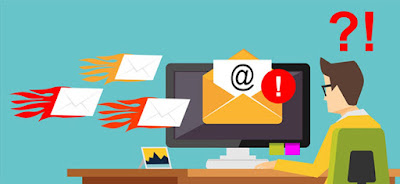WHAT IS EMAIL BOMBARDMENT?


When at some point you discover something strange on your computer and you think that that there could be spyware or an epidemic, the foremost common decision is typically to look the Internet for a program to eliminate it. At the very least, we've tried to seek out the name of such malicious software and look for information about it on the web. So far so good.

The problem is that it's quite common to get that the
answer that appears within the first Google results isn't the right. Yes,
you'll see several blogs during which they tell you that the foremost evil and
infectious virus within the world has gotten into you, but that they need the
answer. Everyone tells you a few perfect anti-spyware that works to unravel it.
After installing it on your PC, convinced that you simply
have found the definitive solution, once you do the primary scan, the
anti-spyware tells you that you simply have 200-300 infections and that you
have to solve it as soon as possible. If it's not a fake anti-spyware, you've
got encounter a “fake” or a fake antivirus that provides false positives. What
does this mean? We are talking about software that tells you that your computer
has many infections, when presumably it's not.
Their objective is for you to download the program, either
because it is another spyware, or because they want you to buy the antivirus at
all costs, or simply, they will waste tons of your time and take up space on
your computer until you remember to uninstall it. .
What
Can We Learn From A Fake Antivirus?
1. Once you think you've got malicious software, determine
first. Find out what his name is. You can use Windows Defender as a start line,
which is that the same for that OS, or the antivirus you've got installed. When
you know the name of the malware, you'll remove it, and just in case you cannot,
search for information about it. But be very careful; keep calm and go step by
step.
2. Don't trust what all the blogs say. Yes, in this world
there are many liars. And that two or three blogs repeat an equivalent idea
doesn't mean that it's true. Sometimes you write the name of a malware in
Google and tons of blogs begin telling you that the thanks to solve it's by
downloading this or that antivirus. At the very least, fakes will waste some
time.
3. Don't use unknown antivirus. It is only advisable to
seem for an additional antivirus
within the event that you simply don't have one installed, or yours has not
been ready to eliminate the malware. Look for an updated and recognized
antivirus that is not a fake or tries to deceive people by making them buy an
antivirus to clean something they do not have.
4. Clean your browser. Sometimes it is not that you have a
virus, but some uncomfortable extension has been installed in your browser.
With your antivirus you'll be ready to clean the rubbish that's in your
browser, be it Chrome, Explorer or Firefox, and restore the configuration from
the start.
5. Remove it manually, if you know. Some malicious programs
are often removed manually by entering the program files, just in case your
antivirus software doesn't identify them. However, I don't recommend that you
simply use this method if you're not conversant in your OS, as you'll
unknowingly delete files from the system.
So, to stay safe from fake antivirus always check the antivirus name, its
authenticity and how it works, than install it in your computer so that it can
fight with all the chances present in your computer and provides you complete
security from all the threats which will ruin your work or deduct your personal
information by entering in your computer.
Comments
Post a Comment